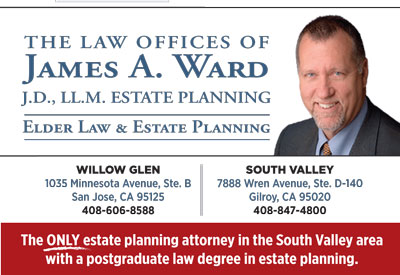“If you can’t explain it to a six-year-old, then you don’t understand it yourself.” — Albert Einstein
![]()
By James Ward

James Ward
 First, do you have an estate plan? You should have an estate plan, and you should also probably have a trust as part of the estate plan, but that’s a discussion for another day.
First, do you have an estate plan? You should have an estate plan, and you should also probably have a trust as part of the estate plan, but that’s a discussion for another day.
If you have a trust, do you know what it says? Do you know how it works? Do you know who will make your decisions if you can’t? Do you know how your assets will be distributed? And, what if your intended beneficiary dies before you? Who gets it then? And what if the beneficiary is receiving disability payments at the time you die? Will the inheritance from you cause them to lose their disability income?
When I ask people about getting a trust, one common answer is, “I already have a trust.” I then ask whether they know what it says, and they admit that they don’t, but they are pretty sure about what it says.
“It ain’t what you know that gets you in trouble. It’s what you know for sure that just ain’t so.” — Mark Twain
Think about it. A good estate plan consists of several critical documents to protect you and your intended beneficiaries.
I just had a widow come to see me about the problems with her trust. She’s in her 60s and had been married to her husband (second marriage) for 18 years. When he became ill, they went to an attorney to have an estate plan prepared. What they were both clear on was that the wife would get 100 percent of the assets if the husband died first. He did die first, and the widow soon found out that the trust they did prior to his death wasn’t done right.
She could easily live another 30 years, but with the trust done wrong, life won’t be easy for her.
 Her family relative, who I’ve known for more than 30 years, brought her to me to see what she had to do. The widow was scared and in tears. She had already spent a lot of money on an attorney who told her that the trust was done wrong and he couldn’t fix it, but he would administer the trust anyway according to the document. This was a costly move against what she wanted, and totally unnecessary.
Her family relative, who I’ve known for more than 30 years, brought her to me to see what she had to do. The widow was scared and in tears. She had already spent a lot of money on an attorney who told her that the trust was done wrong and he couldn’t fix it, but he would administer the trust anyway according to the document. This was a costly move against what she wanted, and totally unnecessary.
She then went back to the original attorney who charged her twice only to tell her that he hadn’t made a mistake, but she could pay him more to see what he might be able to fix.
It’s no wonder that she was stressed and in tears!
It appears that the original attorney made a mistake, and then the second attorney took the opportunity to charge her to do unnecessary work that furthered and supported the original error. Are you kidding?
But, back to the beginning. Even though the couple was facing the likelihood of the husband dying soon, they didn’t take the time to read and review their trust. I say this with some concern, because clients should be able to trust the work they pay their attorneys to do for them, but most clients aren’t able to understand a lot of the legal documents. Clients should ask their attorney to point out certain things and interpret the legalese for them. If their attorney can’t make sense of the documents for the clients, the clients should find a different attorney.
Make sure that the attorney can explain it to you in plain English. These are your documents. You should understand them. The outcome is critical. It’s your life. If necessary, get a second opinion.
“If you can’t explain it to a six-year-old, then you don’t understand it yourself.” — Albert Einstein






